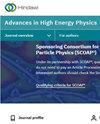Quark-Antiquark Effective Potential in Symplectic Quantum Mechanics
IF 1.1
4区 物理与天体物理
Q3 PHYSICS, PARTICLES & FIELDS
引用次数: 1
Abstract
In this paper, we study within the structure of Symplectic Quantum Mechanics a bidimensional nonrelativistic strong interaction system which represent the bound state of heavy quark-antiquark, where we consider a Cornell potential which consists of Coulomb-type plus linear potentials. First, we solve the Schrödinger equation in the phase space with the linear potential. The solution (ground state) is obtained and analyzed by means of the Wigner function related to Airy function for the c c ¯ meson. In the second case, to treat the Schrödinger-like equation in the phase space, a procedure based on the Bohlin transformation is presented and applied to the Cornell potential. In this case, the system is separated into two parts, one analogous to the oscillator and the other we treat using perturbation method. Then, we quantized the Hamiltonian with the aid of stars operators in the phase space representation so that we can determine through the algebraic method the eigenfunctions of the undisturbed Hamiltonian (oscillator solution), and the other part of the Hamiltonian was the perturbation method. The eigenfunctions found (undisturbed plus disturbed) are associated with the Wigner function via Weyl product using the representation theory of Galilei group in the phase space. The Wigner function is analyzed, and the nonclassicality of ground state and first excited state is studied by the nonclassicality indicator or negativity parameter of the Wigner function for this system. In some aspects, we observe that the Wigner function offers an easier way to visualize the nonclassic nature of meson system than the wavefunction does phase space.辛量子力学中的夸克-反夸克有效势
本文在辛量子力学的结构中研究了一个表示重夸克反夸克束缚态的二维非相对论强相互作用系统,其中我们考虑了由库仑型加线性势组成的康奈尔势。首先,我们在具有线性势的相空间中求解薛定谔方程。通过与c介子的Airy函数相关的Wigner函数获得并分析了解(基态)。在第二种情况下,为了处理相空间中的类薛定谔方程,提出了一种基于Bohlin变换的程序,并将其应用于Cornell势。在这种情况下,系统被分为两部分,一部分类似于振荡器,另一部分我们使用微扰方法处理。然后,我们在相空间表示中借助恒星算子对哈密顿量进行量化,以便通过代数方法确定未扰动哈密顿量(振子解)的本征函数,而哈密顿量的另一部分是微扰方法。利用Galilei群在相空间中的表示理论,通过Weyl乘积将发现的本征函数(未扰动加扰动)与Wigner函数相关联。分析了Wigner函数,并利用该系统的Wigner方程的非经典指标或负参数研究了基态和第一激发态的非经典性。在某些方面,我们观察到Wigner函数比波函数提供了一种更容易的方式来可视化介子系统的非经典性质。
本文章由计算机程序翻译,如有差异,请以英文原文为准。
求助全文
约1分钟内获得全文
求助全文
来源期刊

Advances in High Energy Physics
PHYSICS, PARTICLES & FIELDS-
CiteScore
3.40
自引率
5.90%
发文量
55
审稿时长
6-12 weeks
期刊介绍:
Advances in High Energy Physics publishes the results of theoretical and experimental research on the nature of, and interaction between, energy and matter. Considering both original research and focussed review articles, the journal welcomes submissions from small research groups and large consortia alike.
 求助内容:
求助内容: 应助结果提醒方式:
应助结果提醒方式:


